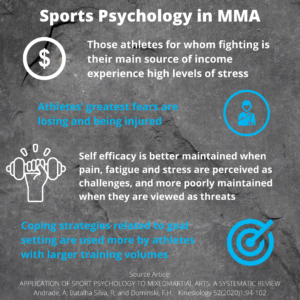BACKGROUND
The effectiveness of sports psychology interventions, or “psychological skills training” has been demonstrated in many sports. The aim of this study was to perform a review of studies directly related to sports psychology in MMA.
METHODS
The terms “mixed mart arts” and “ultimate fighting” were searched in combination with: “Psychology”, “Sport Psychology”, “Exercise Psychology”, “Mood”, “Mood States”, “Anxiety”, “Stress”, “Motivation”, “Mental Training”, “Mental Toughness”, “Coping”, “Burnout”, “Emotions”, “Aggressiveness”. 8 studies were included in the final review. Most of the participants in the studies were male professional athletes aged between 20 and 30.
FINDINGS
Whilst all under the umbrella of sports psychology, the focus and findings of the individual studies were quite varied, and as such the number of collaborative findings between the studies was limited.
Some of the main findings were:
- Those athletes for whom fighting was their main source of income experienced high levels of stress
- Motivation and constant evaluation were found to be useful in helping regulate this stress
- Athletes’ greatest fears were losing and being injured
- Professional athletes score higher on tests of mental toughness than semi-professional and amateur athletes
- Whilst aggressiveness is a key trait of successful athletes, for the most part this aggressiveness was not carried outside the training/competition environment
- Coping strategies related to goal setting were used more by athletes with larger training volumes
- The chaotic nature of MMA bouts is the most stressful aspect for many fighters
- Many athletes note the importance of entering a “flow state”, where they feel in control of their capabilities
- Self efficacy is better maintained when pain, fatigue and stress are perceived as challenges, and more poorly maintained when they are viewed as threats
- There is still only a small degree of sports psychology intervention utilised in professional MMA
IMPLICATIONS
The application of sports psychology to MMA is still in its formative stages. Given the severe demands of the sport, it is likely that sports psychology has much to offer.
Future studies should investigate the longitudinal effect of psychological skills training in combat sports.
